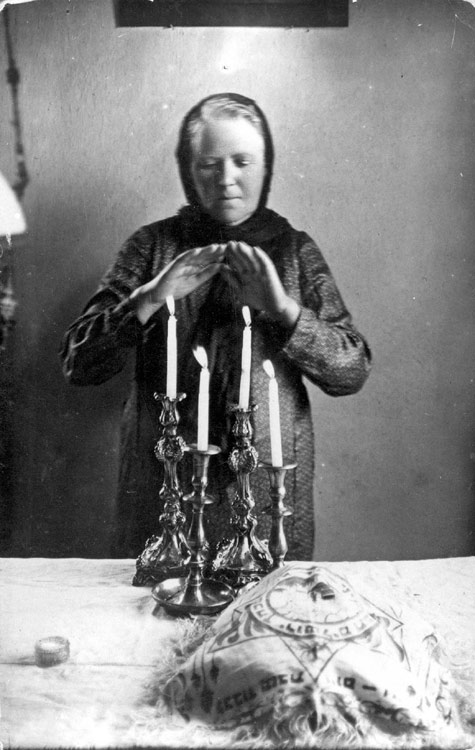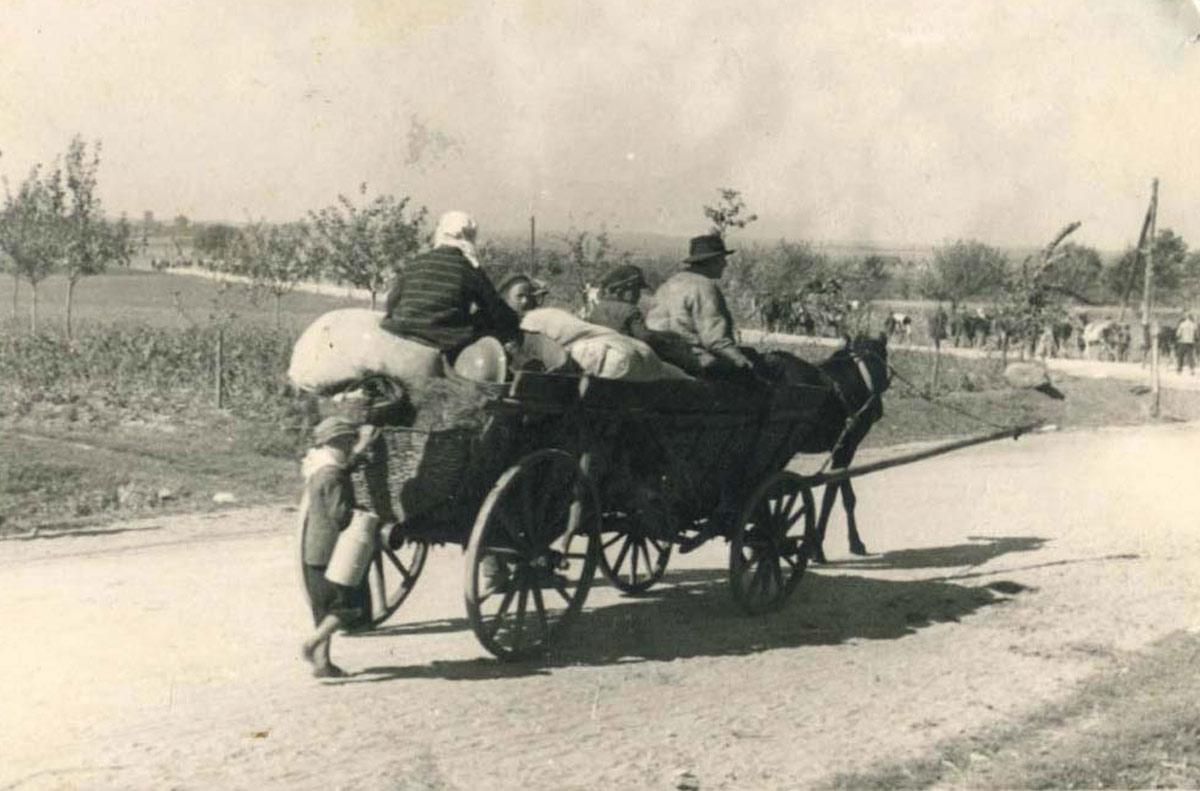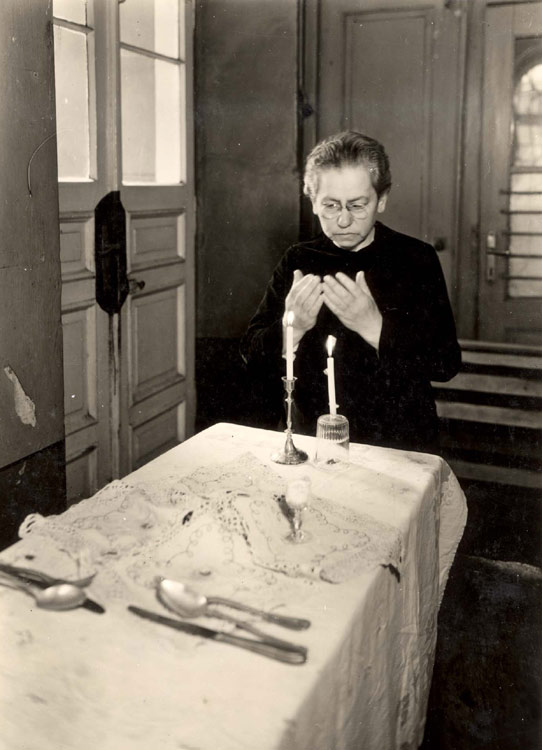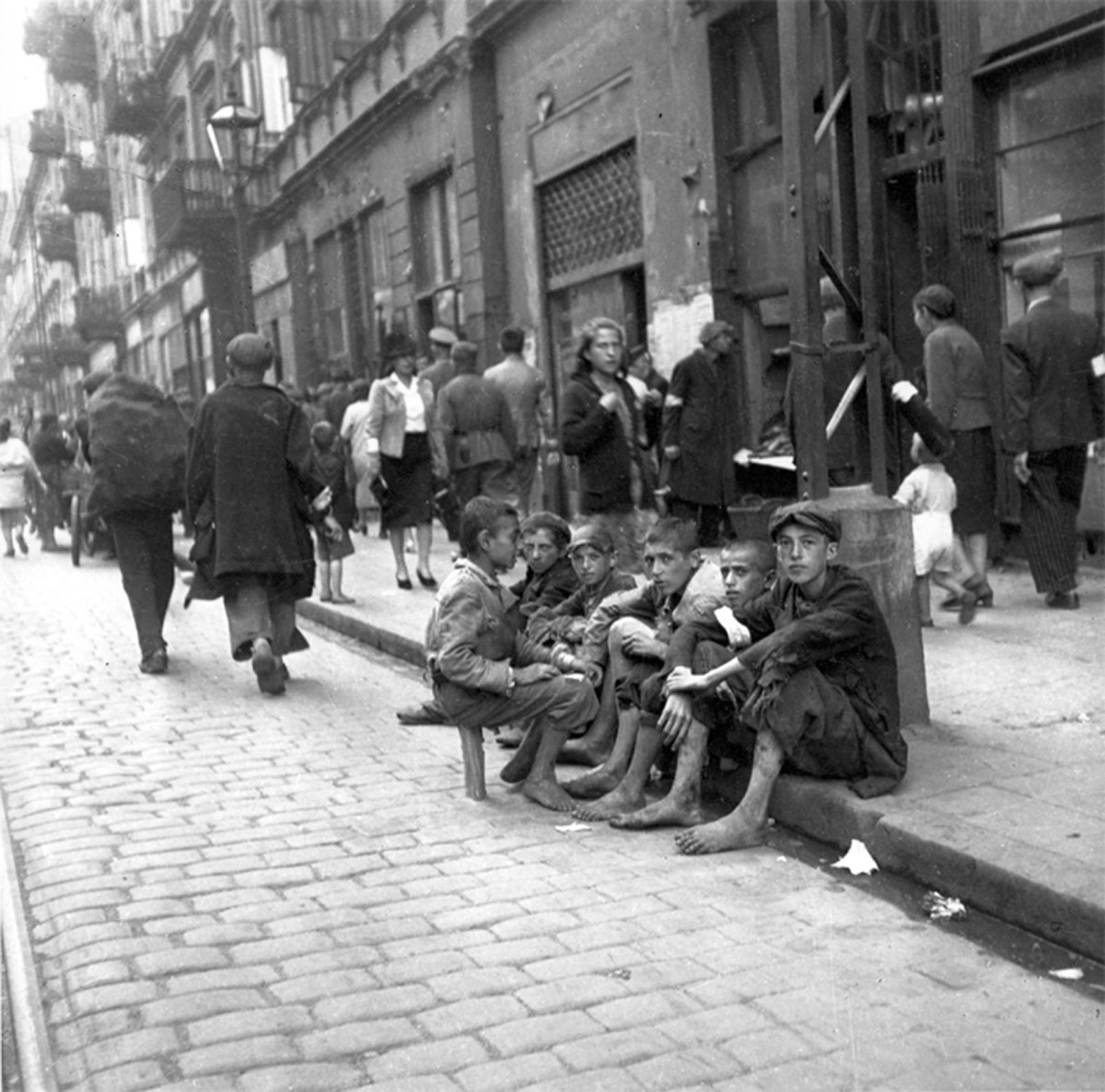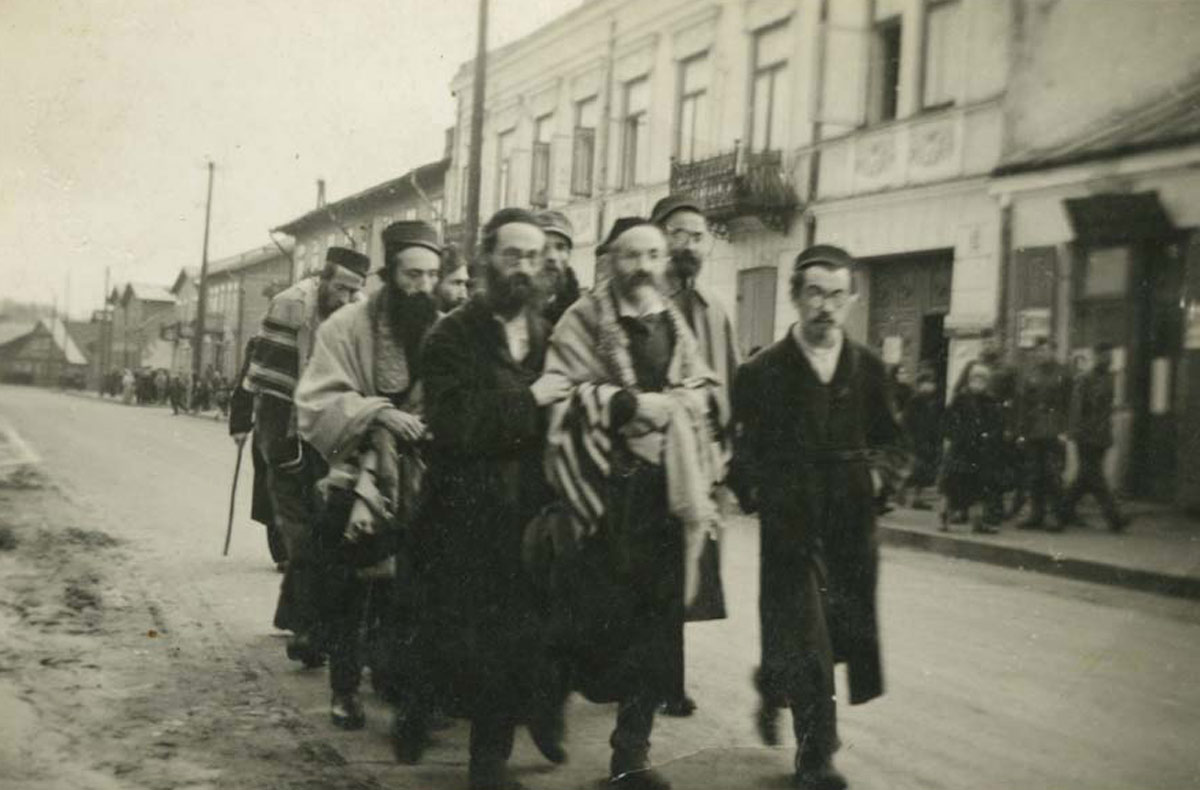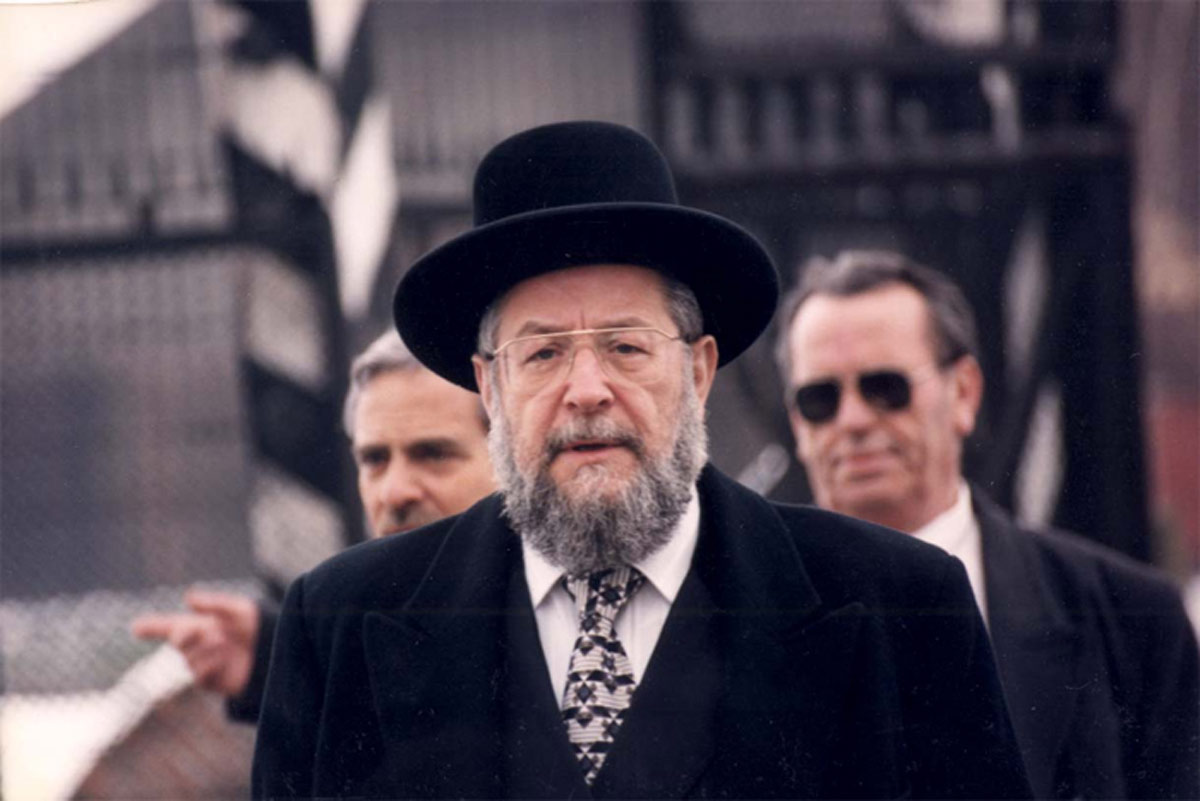Rabbi Kalonymos Kalmish Shapira, the Grand Rabbi of Piaseczna, was born on 19 Iyar 5649 (1889), the grandson and great grandson of the Lizhensk and f Kozhnitz dynasty, and the son-in-law of Rabbi Yerachmiel Moshe of Kozhnitz, who grew up in the courts of the grand rabbis of Grodzisk- Chentchin. When his father-in-law passed away in 1909, he was appointed grand rabbi with Piaseczna as the center of his activity. From 1913 on, he also served as the chief rabbi of Piaseczna. Rabbi Kalonymos Shapira divided his time between Piaseczna and Warsaw, where he established the Daat Moshe yeshiva in 1913. He became renowned as an educator as well as for his innovative writings on Hassidic education, the most prominent of his books being Hovat Hatalmidim [The Students’ Responsibility].
During the Holocaust years, he was in the Warsaw ghetto, where he continued to hold a Hassidic “tish” every Shabbat, and also gave sermons in which he discussed the circumstances of those days. His sermons, which continued up until the final liquidation of the ghetto, were found after the war and published in the book Esh Kodesh [Sacred Fire]. The rabbi of Piaseczna continued to encourage the Jews imprisoned in the ghetto even as the overcrowding, famine and disease decimated them. In his sermons, he tried to prevent them from sinking into depression and called on the Jewish public to try to draw closer to God in order to bring the redemption closer, in particular at the time of distress. When the Aktionen in the ghetto began, in the summer of 1942, with the help of R. Hendel he was registered as a worker in the Schultz factory in the ghetto, and continued his spiritual leadership from there. In one of the Aktionen in the ghetto, he was taken, but was released thanks to the intervention of ghetto officials. Later he was taken to the labor camp in Budzyn, in the Lublin district, where he was apparently murdered on November 3, 1943 (5 Heshvan, 5703).The Hoshano for Shabbats which begins with" אום נצורה" contains the phrase יושבת וממתנת עד כלות שבת "
Rabbi Ephraim Oshry was born in Lithuania and educated in the Ponevezh and Slobodka yeshivot. After World War II broke out and the deportation into the Kovno ghetto, he gave Torah lessons in the Halvayat Hamet kloyz and the Tiferet Bahurim association in the ghetto. Due to the poor health of Rabbi Shapira, Rav Oshi was asked to respond to the halachic questions sent to the rabbi and to express his opinion on them. Rav Oshi recorded the wartime questions on pieces of paper, which he buried in the ground. After the war, Rav Oshry, published the questions and answers in a book called Mimaamakim [Questions and Responses from the Depths]. Rav Oshry did a great deal to rehabilitate the survivors and established a yeshiva in Rome for young survivors that gathered there. Later, he worked to establish yeshivot in Montreal and New York. From 1952 (5702) until his death 52 years later, he served as the rabbi of the Beth Hamedrash Hagadol congregation in New York.
The Lodz ghetto – In 1939, about 223,000 Jews lived in Lodz, representing more than one-third of the city’s population. In April 1940, about 164,000 of Lodz’s Jews were forced into the most neglected area of the city, where the ghetto was established. (Many of the city’s inhabitants had fled to other areas of Poland.) The ghetto was extremely overcrowded; it contained only 48,000 residential rooms (with an average of about five people per room, most in wooden buildings without running water or plumbing. These living conditions led to epidemics, especially typhus, and many people died as a result. Hunger was the greatest and most constant source of distress for the residents of the Lodz ghetto, who received a very meager food ration for four years. Many reasons related to the history of this ghetto prevented black marketeering and the smuggling of food into the ghetto, so that it was almost impossible to obtain any additional food. In the ghetto, there were political parties and youth organizations that developed cultural activities. They established libraries, held cultural evenings, theater plays, etc. Religious educational frameworks were active both openly and secretly. During the time of the ghetto’s existence, numerous inhabitants were deported, at first to the Chelmno death camp. The Lodz ghetto was liquidated in the spring of 1944, and most of its inhabitants were deported to Auschwitz, where they were murdered.
Many people in Lodz made great efforts to preserve a religious framework and the rabbis continually examined the rulings they handed down in real time.Sarah Beinhorn (Klein) grew up in a lively, warm and loving home in the city of Munkatch, a city known for its gaiety. Thanks to the warmth of her parents’ home, her pure faith and joy of life, she managed, thanks to God's grace, to survive the Birkenau and Bergen-Belsen camps, together with her two sisters. After a period of rehabilitation in Sweden and incarceration in Cyprus, she arrived in Israel and here built her family on the strong foundations that she preserved from her parents’ home.
1. The Grand Rabbi of Piaseczna1 spoke about Shabbat in his sermon on the Vayakhel portion of the week:
The Sabbath, however, is intrinsically holy, as it is written, “It is holy for you.:” (Exodus 31:14) This is why there is no special commandment to fulfill on the Sabbath itself. On Rosh Hashanah we are commanded to blow the shofar, on Yom Kippur we must take upon ourselves the five hardships of Yom Kippur, and on Sukkoth we are commanded to take the four species and dwell in a sukkah; but on the Sabbath all that is required is that we refrain from working. Moreover, it is well known that because the Sabbath is capable of sanctifying the other six days of the week, the holiness of the Sabbath suffuses the six days. Until Wednesday we receive the holiness from the previous Sabbath, and from Wednesday onwards we receive holiness from the Sabbath that is coming. In the same way that physical bodies become holy on the Sabbath, so also are the days of the week sanctified, and this is why the Sabbath requires no special commandment, making us responsible to prepare it for sanctification.
Rabbi Kalonymos Kalmish Shapira, Sacred Fire, trans.J. Hershy Worch, ed. Deborah Miller (Jerusalem: Jason Aronson, 2000), p 46.
- What is the unique nature of Shabbat according to the rabbi?
2. When World War II broke out and the Nazi policies against the Jews were launched, the lives of the Jews were thrown into disorder and a shadow was cast over Shabbat.
Miriam Raz-Zunszajn was the daughter of the rabbi of Wereszczyn ,Poland. She was eight years old when the Germans invaded Poland. This is how she describes the first day of the war, Friday, September 2, 1939 – 17 Elul, 5699, in her memoirs and the Shabbat that followed:
Dark clouds covered the sky. Thunder, lightning and rain. The faces of my mother and father were even grayer than the clouds. War! say my parents, and I understand from their reaction that war is something menacing, even though I don’t know exactly in what way. Apparently, everything is because of this war, which both piques my curiosity and frightens me. My parents are very concerned, trying to understand if the thunder they hear is the roar of cannons. I am very confused: I know a prayer against fear of thunder, but no one has taught me what to say to ward off the thunder of cannons… Father and Mother are very concerned by their problems and I don’t dare turn to them with my questions and fears. My younger siblings don’t understand what is going on around them. They carry on playing as usual and I really envy them. In the evening, the Shabbat table is covered with a festive white tablecloth, the braided challahs are also covered by their special cloth, the silver candlesticks glisten as always, but this time, the candle lighting is completely different. Grandmother and Mother bless the candles, but the blessing is accompanied by bitter weeping and takes a very, very long time. I am very upset by Grandmother and mother’s crying and burst out in loud weeping that I have been holding inside for many hours. [...]
On this Shabbat, we remain indoors and don’t go out for a walk as we usually do… We are cut off from the material world, but the material world does not cut itself off from us. The thunder of cannons becomes ever louder, closer, and no one knows what to expect when it reaches us. One thing happens after another, the world around me seems to be sinking into a whirlpool. Numerous people with their belongings pass through our village day and night on their way eastward. German planes flew low over the village with a deafening roar, and mother hides us under the beds. Rumor has it that the planes are shooting at everyone they see and especially at the convoys of refugees making their way on the roads.
Miriam Raz-Zunszajn, Like Birds in Black and White, Moreshet, Tel Aviv 2002, p. 11-12)
- What are the main difficulties in honoring Shabbat that Miriam discusses?
- How do her observations relate to those of the rabbi of Piaseczna regarding the sanctity of Shabbat?
- 1. 1
3. Simhah Bunim Vakshtok discusses additional difficulties during the early days of the war. His family was faced with the question of whether or not to flee to the east on Shabbat from the invading Nazis:
We will not travel on Shabbat ! father decided. If Hashem wishes to, he will rescue us without us desecrating Shabbat. We therefore observed that which is written in the prayer: "she (the congregation of Israel) sits and awaits for the Shabbat to end”2 with the intention to join those fleeing from the city after Shabbat.
Three stars announced the end of Shabbat. We realized that we had to hurry and leave the city. But where would we find a wagon and driver who would agree to drive us? [...]
after numerous efforts we turned back from whence we came. Hundreds of other people turned back as well
- What laws did the family observe by not joining those fleeing at the beginning of the war? (In which mishnayot are these laws mentioned or hinted at?)
- What price did the family pay?
Please note: When the war broke out, many tried to flee to the east, but very few actually succeeded due to the difficulties of traveling and the obstacles that the war created.
- 2. 2
4. About a year after the war broke out, the Nazis began to isolate the Jews in ghettos. This was yet another step in the attempt to rob them of their human dignity. The Jews were forced to contend with numerous difficulties in their day-to-day lives and in observing the commandments. In light of the terrible conditions they encountered in the ghettos, which was often manifested in starvation and disease, Rabbi Oshry3 was asked a question in regard to the lighting of the Shabbat candles:
Question: In 5702 (1942), I was asked by people in the Kovno Ghetto whether they might fulfill the mitzvah of lighting the Shabbat candles by using electric lights, and whether they might recite the blessing Lehadlik neir shel Shabbat on those lights. People who all their lives had been careful to fulfill this mitzvah were unable to obtain candles because of the very fact that they were locked up in the ghetto. Electricity, however, was available.
Response: I ruled that where it is not possible under any circumstances to obtain Shabbat candles, it is permissible to recite the blessing on electric lighting. Similarly, one may recite the blessing Borey meorey hoeish on an electric bulb upon the termination of Shabbat.
Ephraim Oshry, Responsa from the Holocaust (New York: Judaica Press, 2001), p.50
- The mishna most closely connected to this question ___________________________________________ Based on which halachic principle did the rabbi permit the blessing over electric light? ____________________________________________________________
5. In the camps too, where the living conditions were even worse, the women encountered great difficulty in lighting the Shabbat candles. This is a description by one of those women of how they tried to contend with this difficulty:
During those days of horror we tried to create, at least for a few moments, a festive atmosphere, an atmosphere of Sabbath holiness, through prayer and kindling candles. We received candles from our “Canada” girlfriends who wrapped packages, and we lit them with tears streaming from our eyes, starting from our second Sabbath there. […]
During all our tribulations we always tried to observe the precept of lighting Sabbath and holiday candles. Sometimes a hollowed-out potato filled with margarine and a rag wick inside of it would serve as our Sabbath candle in the darkness of our property. While we were working in an arms factory, we brought screws from our place of work, and, filling them with machine oil, made Sabbath candles. […]
The ability if the women to supply themselves with oil and wicks was boundless. Still, there were times when it was impossible to obtain candles. Then they would light candles symbolically; I myself saw Sabbath candles kindled symbolically twice. On a dark and foggy Sabbath Eve in November 1944, we had to go, in our usual squads of five, to work on the twelve-hour night shift. We walked bitterly in our tattered clothing, through kilometers of mud and filth, to the armaments factory. Suddenly, the woman next to me, who was from Sub-Carpathia began to speak: “I just lit the Sabbath candles.”
I listened to what she said with astonishment.
“I saw two electric bulbs and said the blessing on them,” she added.
Another time, on a Friday night, in the factory I saw a woman from Mármaros, whose job was to polish small iron hoops and rings, take some of the rings and arrange them into, as it were, candles and candlesticks, and then cover her face with her hands and silently recite the blessing over the kindling of the sabbath candles.
Naomi Winkler, “Jewish Customs in the death camps for women,”Yad Vashem News, 37 [Shvat, 1967])
- To what do the women’s efforts attest to?
- In your opinion, which mishna is most closely connected to this source: __________________________________________________________________
- 3. 3
6. The living conditions in the ghetto prevented almost every form of communal and Jewish life. The rabbi of Piaseczna speaks here about the pain at the desecration of the Shabbat carried out under duress:
Who can avoid pain when seeing such suffering of body and spirit? Who is it whose heart does not break when he sees the lack of schools and yeshivas—no places of Torah and no gathering of students to learn Torah? This is not just pain over the current situation, and it is not just now that the houses of G-d are destroyed. What is happening now will effect the future, because from now on there will be a shortage of young men to learn Torah. How many of them are gone, incomprehensibly murdered or starved to deaths, May the Merciful One protect us? How many have been forced to concentrate only on their physical survival? Where will we find young men to learn Torah in the future, if they do not learn now? How many of them have been unable to withstand the test, and have been driven by hunger to go out on the Shabbat to do business in the marketplace? What can we expect of the children and young men who spent years in the markets and on the streets doing business, knocking at doors, begging for crumbs of bread during the week and on the Shabbat? Will they take advantage of the opportunity to return to the schools, and yeshivot, and will everything be as it once was?
Kalonymos Kalmish Shapira, Sacred Fire: Torah from the Years of Fury, 1939–1942 p. 206-207
- What are the difficulties noted by Yaakov Krieger? How did they try to contend with them?
7. Yaakov Krieger of Lodz4 testifies to further difficulties in keeping Shabbat in the ghetto:
During the days of the week, I hardly saw my sisters. Nor did I see other people I wanted to meet. When my sisters returned from work in the evening – I was just going out to do my work; and in the morning when they left the house for work – I was just coming home. Shabbat was a regular workday in the ghetto, but on Friday nights, I managed to make a special arrangement, to come two hours late to work. We would receive Shabbat and have the Shabbat meal together. During the week, I managed, following a number of failed attempts, to make a candle with a wick in honor of Shabbat. I wanted to surprise my sisters and bring them the candle for the second Shabbat; but my sisters surprised me first. On Friday, when I returned from my night shift, I found a note on the table with a few slices of bread near it. This is what it said: “Our dear brother! Upon your return from Germany, you returned a precious treasure to us – the Shabbat. We had almost forgotten what Shabbat and the sanctity of the day felt like, if not for the past Shabbat, with the Kiddush and the bread and all the rest. So that you don’t have to fast on Friday, leaving your bread for the evening, we have decided to help you. So that we too can have our part in this mitzvah, we have saved one small slice of our bread during the week, which we have divided up for the three of us – so that we can eat it today in honor of Shabbat. The slices on the table are yours, enjoy them! This arrangement will make it possible to recite the Kiddush over an entire loaf and afterwards to divide it up into the remaining portions.” I safeguarded the slices and began to prepare the soup just as I did the previous week. I put a white tablecloth on the table, upon which I placed the entire loaf of bread for Kiddush, and I covered the bread with a cloth. I added the two candlesticks with the candles I made, washed myself and waiting for my sisters to come home. As we sat together around the Shabbat table somewhat satisfied, calmer than usual singing the Shabbat zmirot, I realized the positive impact my return to the ghetto had had on my sisters [...].
Those Friday nights were sacred hours, hours that illuminated the darkness of the ghetto in the shadow of death. The candles went out and I left the house on my way to my night shift, and my sisters went to bed to gather a little strength for another day of work…
Yaakov Krieger, Hiyatanu Shem Olam, Kfar Haroeh, 2001, pp. 126-127)
- Which mishna in the masechet before us can we say that the rabbi is upholding with these words?
8. The difficulties in observing the Shabbat were even greater in the camps. Sarah Beinhorn5 discusses this:
We were tested and the tests were not easy by any means. First, the water for the laundry was heated only on Shabbat afternoon, because that is when all the shifts were gathered in the barracks. Those that observed Shabbat were forced to wash their clothes on Sunday in cold water, and in the European cold when the dresses did not dry – the girls were forced to wear their dresses wet, until they dried on their bodies, or froze in the cold.
Cleaning and arranging the room was of course left for Sunday, and many of the girls deliberated and argued among themselves over whether it was permitted to benefit from the oven that had been fired on Shabbat…
Sarah Beinhorn [Klein], Yehudit Golan, ed., Leaves That Rose from the Ashes Bnei Brak, 1999, p. 8)
- The source tells of the ways the girls tried to revitalize the sanctity of Shabbat. What were the difficulties that the girls encountered in observing Shabbat?
- In my opinion, the mishnayot most connected to the source here are: ________________________________________________________
9. Rabbi Lau also talks about the Shabbat days when the prayers played an important role:
It was the first night in Częstochowa, a Friday night. Naphtali was at my side, when, suddenly from the end of the barracks, we heard the familiar tune from distant times: Cantor Yossel Mandelbaum was singing Mikdash Melech from the Friday night Lecha Dodi prayer. The melody carried echoes from the past, a distant memory of home, allowing me to momentarily forget the events of recent days [...]
Forty years later the Admor spoke with my brother, and Naphtali mentioned the story of Yossel Mandelbaum who had sung the Mikdash Melech stanza from Lecha Dodi on Shabbat eve in Czestochowa, thus unwittingly making an invaluable contribution to our spiritual vitality. Cantor Mandelbaum had restored us to the safe refuge of our family despite the grim conditions in the camp. “What a pity that we lost track of him in Buchenwald,” Naphtali lamented. The rebbe whispered something in the ear of one of his assistants. A few minutes later, the assistant reappeared, holding the arm of a diminutive Jew with an impressive white beard. "Here is Yossel Mandelbaum!" Announced the rebbe. He then asked the elderly man, who was more than eighty years old, to sing the Mikdash Melech stanza from Lecha Dodi. Naphtali listened, astounded. Despite the forty years that had passed and his diminished height, Yossel Manelbaum's voice had not changed, and remained as clear and strong as it was then. As Yossel sang the phrase, "Arise and depart from amid the upheaval," Naphtali no longer saw the Chassidim of the rebbe in Brooklyn but the miserable wretches who sat on the cold, damp ground of the barracks in Czestochowa that Shabbat eve in late November 1944.
Israel Meir Lau Out of the Depths: The Story of a Boy from Buchenwald who Finally Came Home, New York, 2011, pp. 30-36; translated by Jessica Setbon and Shira Leibowitz Schmidt.
- What role did Shabbat prayers fulfill in the Częstochowa camp, according to Rabbi Lau?
- How do Rabbi Lau’s words support the words of the Grand Rabbi of Piaseczna about Shabbat that we read earlier in the lesson.
The Sabbath, however, is intrinsically holy, as it is written, “It is holy for you.:” (Exodus 31:14) This is why there is no special commandment to fulfill on the Sabbath itself. On Rosh Hashanah we are commanded to blow the shofar, on Yom Kippur we must take upon ourselves the five hardships of Yom Kippur, and on Sukkoth we are commanded to take the four species and dwell in a sukkah; but on the Sabbath all that is required is that we refrain from working. Moreover, it is well known that because the Sabbath is capable of sanctifying the other six days of the week, the holiness of the Sabbath suffuses the six days. Until Wednesday we receive the holiness from the previous Sabbath, and from Wednesday onwards we receive holiness from the Sabbath that is coming. In the same way that physical bodies become holy on the Sabbath, so also are the days of the week sanctified, and this is why the Sabbath requires no special commandment, making us responsible to prepare it for sanctification.
Rabbi Kalonymos Kalmish Shapira, Sacred Fire, trans. J. Hershy Worch, ed. Deborah Miller (Jerusalem: Jason Aronson, 2000), p 46.




